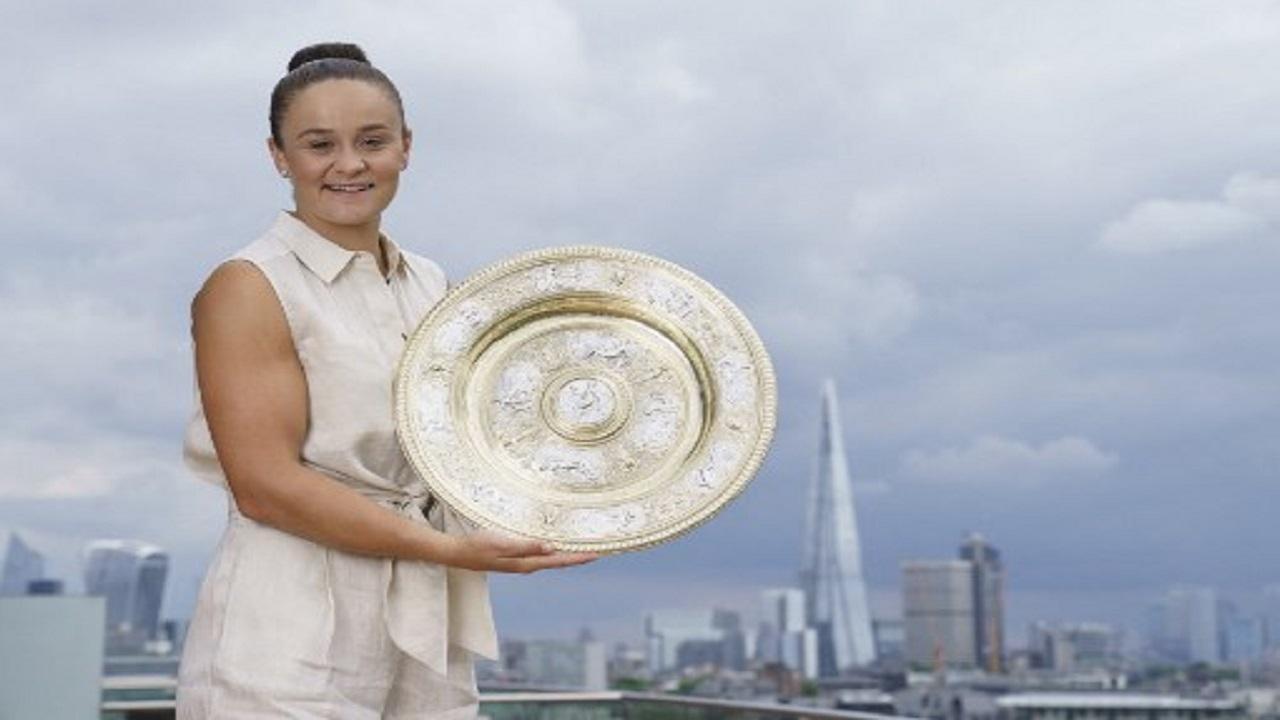Whenever the opportunity arises, it’s important for influential people to celebrate and showcase their heritage to inspire others. Ashleigh Barty with her indigenous origins, did that when she won the Ladies’ Singles title at Wimbledon last weekend

Australia's Ashleigh Barty holds The Venus Rosewater Dish after winning the Ladies’ Singles Final during The Championships 2021. Pic/AFP
When Australian Ashleigh Barty realised her long-kept dream of holding aloft the Venus Rosewater Dish after a well-fought final against Karolina Pliskova, the emotion was there for all to see on Centre Court, as well as among the millions who watched the match live on their television sets. She had paid the ultimate tribute to her mentor, fellow Australian Evonne Goolagong Cawley who was the last Australian woman to have won the title [twice, 1970 and 1981]. There is another, deeper connection between the two women that made the win extra special. Goolagong Cawley is an indigenous Australian, while Barty’s father, Robert, is part of the Ngarigo people, an aboriginal people who belong to New South Wales.
ADVERTISEMENT
In support of her people
In her first round of this year’s Championships, Barty’s tennis apparel sported a design inspired by the same dress worn by the legend herself during her Wimbledon victories. The dainty pattern added a sentimental touch to proceedings at SW19, automatically grabbing the eyeballs of the history-crazed British public and press. And so by the time, she lifted the coveted trophy after Katherine, the Duchess of Cambridge handed it over to her, substantial column space and air time had already been devoted over two weeks, discussing her indigenous roots and how apart from creating women’s tennis history with each win, her support for her people back in Australia deserved applause. Soon, clips from documentaries and websites highlighting Barty’s efforts to popularise tennis among the aboriginal community, especially young girls, did the rounds on social media. When she, like her mentor, conquered the grass courts of Wimbledon, they managed to keep that spirit alive and also automatically, give an impetus to Barty’s work, as well as Goolagong Cawley’s project, to use sport as a tool to empower the community.
I was reminded of similar intent and pride, albeit from a very different platform that was a refreshing take to highlight one’s heritage. I was in the process of polishing off a very delicious meal while in conversation with the owner of a new restaurant in Thane. He was a fourth-generation member of the Koli community, and was immensely proud of the fact that he could use his restaurant as a place to showcase his community’s unique culinary heritage. “I wanted to take a leap of faith; it was a risk and everyone including my father, who still goes out to sea, was anxious. But now, when they see patrons enjoying authentic Koli fare cooked from the fresh catch that he and his fellow fishermen bring to shore and prepared using recipes from our family, the joy is unparalleled,” he shared. It made the meal even more memorable. The young entrepreneur who had a business degree from one of the city’s leading management colleges, had taken the opportunity with both hands. Today, I am happy to say that the same restaurant has several outlets across Mulund and Thane.
Examples like these stride across different worlds, cultures and circumstances but they both have the same, common goal in mind. For the indigenous tennis champ Barty and the young Koli entrepreneur, their foot will never get off the pedal when it comes to giving their community’s legacy and heritage its due.
In the past, so many examples emerge from popular culture where heroes and people of influence have played their roles to effect change. Tommie Smith and John Carlos, African-American athletes who raised their hands at the podium, at the 1968 Olympics in Mexico City, showed solidarity with black people. Then, there is Mexican actor Salma Hayek, who has been championing the cause to help open more doors for Hispanic artistes to break new ground in the big, bad world of Hollywood. Her portrayal of Frida Kahlo in the cult film continues to be an inspiration to Latino-American actors. Earlier this year, Afro-fusion artiste Burna Boy’s stunning win in the Global Music [formerly World Music) category at the 2021 Grammy Awards brought to light the thriving talent of his home nation Nigeria. Suddenly, producers from the West were looking at the tiny African country to find their next big music brand.
Ambassadors needed
Cultural heritage — be it tangible or otherwise — needs its ambassadors to keep it alive and well-oiled for future generations to respect. And it is up to influencers to acknowledge their roots on the big stage to ensure it doesn’t remain a symbolic act or a momentary photo-op but something more far-reaching, inclusive and purposeful enough to spur next Barty to lift a Grand Slam title or more members of the Koli community to celebrate their culinary legacy.
mid-day’s Features Editor Fiona Fernandez relishes the city’s sights, sounds, smells and stones...wherever the ink and the inclination takes her. She tweets @bombayana
Send your feedback to [email protected]
 Subscribe today by clicking the link and stay updated with the latest news!" Click here!
Subscribe today by clicking the link and stay updated with the latest news!" Click here!






